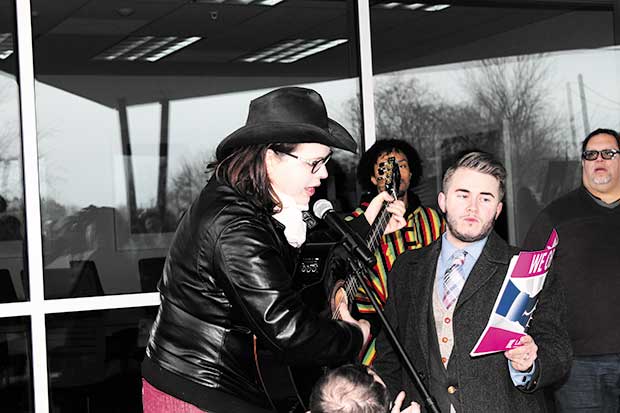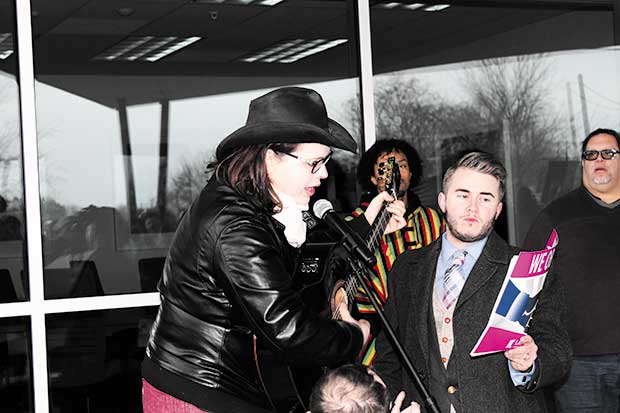Johnny Boucher stays focused on teaching, not his gender identity

Johnny Boucher, right, at the We’re Not Going Back rally held recently at Resource Center, to protest anti-LGBT actions by the Trump administration. (David Taffet/Dallas Voice)
DAVID TAFFET | Senior Staff Writer
Johnny Boucher said recently he has decided to run for Grand Prairie school board because he believes he can improve education in his city.
Although Boucher lives in Grand Prairie, he teaches children ages 3-to-6 at the Eduardo Mata Montessori School in the Lakewood area of Dallas. That school had been slated to close because of declining enrollment. But when the neighborhood was polled, residents said they’d return their children to public school if an innovative school opened. So after three years as a Montessori school, with mixed-age classes of children learning at their own pace, the school is looking at a waiting list longer than its total enrollment has been.
“Eccentric teaching and teachers are drawn there,” Boucher said of the school, adding that he is proud to count himself among the eccentric. But how have parents reacted to their kids having a transgender teacher? There’s been a “cool factor” about it, Boucher said.
This wasn’t Boucher’s first teaching assignment in DISD. Before finding a home at Mata, Boucher taught in a West Dallas school where students overall tested in the 33rd percentile. During his first year at the school, his students tested in the 90th percentile.
When the principal called him to the office to discuss it, Boucher said he was expecting a pat on the back. Instead, he was accused of giving his students the answers to the tests. He said he discovered that the principal had expected students to fail, and had expected Boucher’s students to fare even worse, since Boucher is transgender.
Even though he only recently announced his campaign for Grand Prairie school board, Boucher said he has quickly learned that some people in his district are suspicious. They want to know if he is running just to get protections for transgender teachers added to the district’s policies.
Grand Prairie’s enumerated anti-bullying policy is already as good as those in place in the Dallas and Fort Worth school districts so that’s not an issue, Boucher said. But he readily admits that he thinks it would be nice if Grand Prairie ISD, which does have explicit protections in place for its LGBT students, would extend those protections to its faculty and staff.
Still, that’s not why he’s running.
As a teacher, he said, he’s had success. But as a school board member, he added, he could work with an entire district to help implement the kinds of teaching methods he knows work.
Boucher, who’s been living a quiet life in Grand Prairie for nine years, married his wife Ashley in 2014, before the Obergefell marriage equality decision. When a question arose of how transgender people should be regarded by county clerks regarding issuing marriage licenses, then-Attorney General Greg Abbott said sex should be based on birth certificates. But since Ashley is also transgender, their birth certificates at the time showed them to be an opposite-sex couple.
So getting a marriage license wasn’t a problem. The couple just showed their documents at the county clerk’s office, which proved their eligibility. It was finding an officiant that proved difficult.
With marriage license in hand, the couple wanted to be married by a judge so their marriage would be less likely to be challenged. They also didn’t want to just show up and surprise a judge who might be uncomfortable with the situation, so they began making calls.
“We mostly talked to clerks who never called us back,” Boucher said. One clerk kept them on hold for more than an hour before telling them he’d get back to them — and then never did.
One judge told them he wouldn’t be comfortable doing their wedding.
They ended up speaking to a dozen Dallas County judges before they got through to Judge Carl Ginsberg, who understood the marriage was perfectly legal under Texas law. So on Valentine’s Day, Ginsburg married the couple. So many people attended, Boucher said, Ginsberg had to change courtrooms to accommodate the crowd.
At the time, Boucher was still teaching in West Dallas, and their wedding got quite a bit of publicity on local news. Afterwards, at school, Boucher noticed that he started getting written up for trumped-up infractions. So at the end of the school year, Boucher changed campuses and his former principal was investigated on a variety of issues, including accusing Boucher of giving students answers to standardized tests.
By June, Boucher will have earned his masters degree from SMU. He said he finished all required course work last semester and is currently taking a few electives. Since transferring to his current school in Lakewood, he’s been named Teacher of the Year and received two innovative teaching awards.
Boucher said he’s often thought it was “a shame that I can’t help other teachers do this better.” And he said he’d thought of running for school board before. But the tipping point, he said, was the appointment of Betsy DeVos as Education Secretary.
Boucher said issues he would want to address include teacher pay in Grand Prairie, which is lower than in Dallas. While GPISD pays based on years of service, Dallas has a program called Teacher Excellence Initiative, which pays successful teachers higher salaries.
“That keeps highly-qualified teachers” in the district, Boucher said.
Lots of DISD teachers live in Grand Prairie, Boucher said, adding that as a GPISD trustee he would look at what Grand Prairie can do about compensation that might attract some of those teachers to work closer to home.
Boucher knows his election will be a tough battle, but he hopes people focus on his being a good teacher rather than his being transgender.
This article appeared in the Dallas Voice print edition March 3, 2017.















